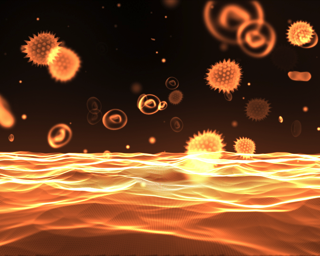 In the midst of flu season, many people’s attention turns to the flu vaccine. But there is a way to improve your immunity against not only the flu, but also other viruses, bacterial infections, yeasts, environmental toxins, food sensitivities, and even autoimmunity. The secret lies in what immunologist Aristo Vojdani, PhD calls nature’s vaccine — secretory IgA (SIgA).
In the midst of flu season, many people’s attention turns to the flu vaccine. But there is a way to improve your immunity against not only the flu, but also other viruses, bacterial infections, yeasts, environmental toxins, food sensitivities, and even autoimmunity. The secret lies in what immunologist Aristo Vojdani, PhD calls nature’s vaccine — secretory IgA (SIgA).
SIgA are immune cells that are the first line of defense between you and the world. They primarily reside in mucus membranes, including the digestive tract, respiratory tract, urinary tract, prostate, and vagina. SIgA cells are found in mucus, tears, saliva, sweat, breast milk, and other secretions.
SIgA cells are the first to encounter invaders and sequester them so they are not dangerous to the body. This helps prevent the immune system from over reacting so it is not prone to food sensitivities, chemical sensitivities, and autoimmunity.
Many people have low SIgA
Unfortunately, having low SIgA levels is pretty common these days. It’s most often seen in individuals with adrenal fatigue who show symptoms of chronic tiredness, low blood sugar, difficulty getting up in the morning, depression, anxiety, salt cravings, and chronic illness.
Taking corticosteroid medications can also lower SIgA levels.
Low SIgA levels increases cold and flu risk
Chronically low SIgA levels has a number of consequences. The most obvious is that you are more likely to get sick frequently. For instance, if your respiratory tract is low in SIgA cells, the viruses and bacteria it encounters are going to have an easier time invading your system.
Low SIgA leads to food and chemical sensitivities
What’s perhaps more frustrating is that low SIgA levels can lead to the development of food and chemical sensitivities. Why? Your SIgA play a pivotal role in your ability to tolerate the world around you while responding appropriately to pathogens.
When there are not enough SIgA to neutralize incoming bacteria, viruses, yeast, undigested food, chemicals, and so on, the immune system must deploy its more aggressive immune cells. It’s like calling in the Navy Seals because the police force has gone missing.
The result is a hyper reactive immune system that creates a permanent loss of tolerance in the bloodstream to certain foods or chemicals.
Low SIgA raises risk for autoimmunity
One of the more unfortunate risks of SIgA is that it raises your risk of developing autoimmunity. With a diminished defense from low SIgA, your immune system is on constant red alert and your body is more vulnerable to pathogens. Between the increased exposure to pathogens and a hyper reactive immune system, it’s just a matter of time before it starts attacking your own tissue.
Ask my office for ideas on how to test for and increase your SIgA levels.





Latest from the Blog
The Death of Red Dye #3
January 15, 2025What Is Red Dye No. 3? Red Dye No. 3, or Erythrosine, is a synthetic food color derived from coal tar. It was first approved by the FDA in the 1950s and quickly became one of the most popular artificial colors in food and cosmetics. Red Dye No. 3 was used in everything from candies, […] Read more
Latest from the Blog
Do You Know What Is In Your Protein Powder?
What’s Really in Your Protein Powder? Understanding the Risks Protein powders are a staple in many health-conscious diets, from athletes seeking muscle recovery to those simply aiming to boost their daily protein intake. With a wide variety of options available, choosing the right one can feel overwhelming. However, recent findings have raised concerns about what’s […] Read more